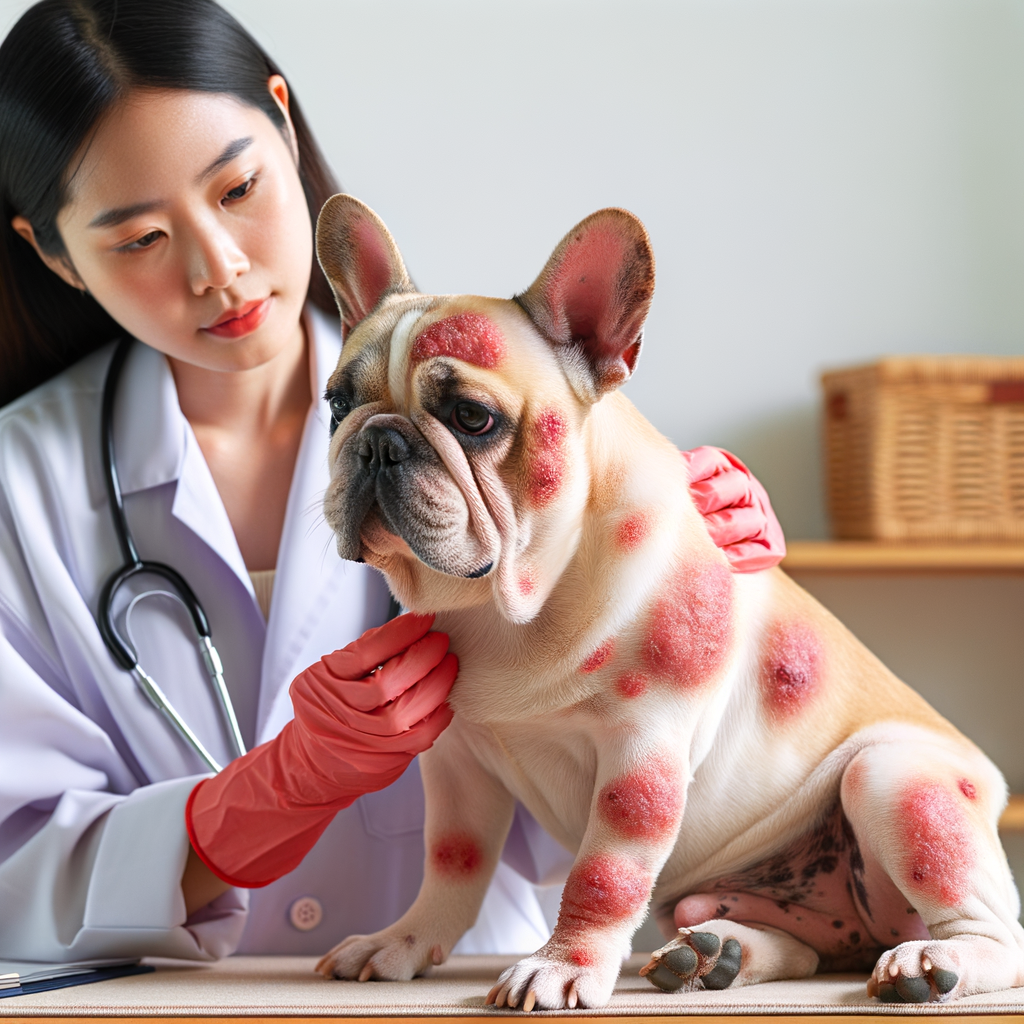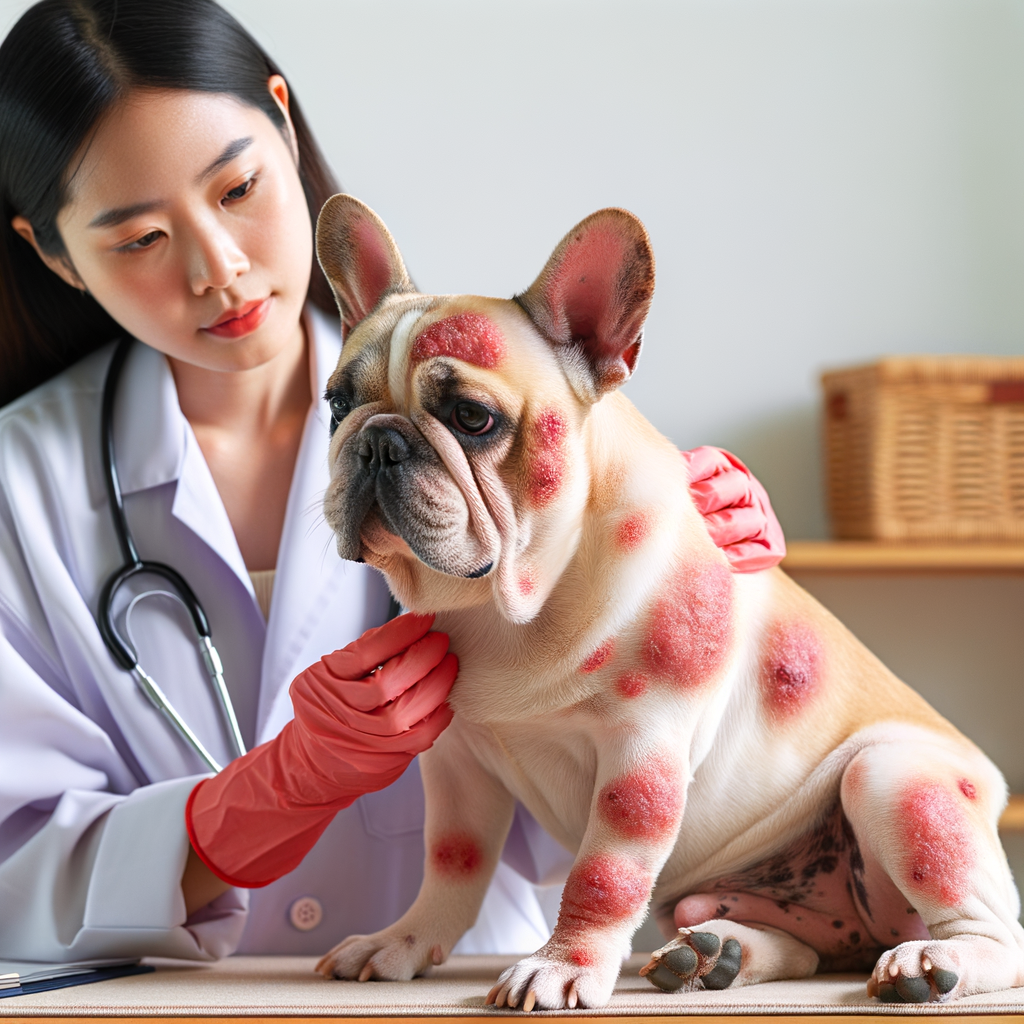
Introduction to French Bulldog Allergies
French Bulldogs are adorable and friendly pets. However, like many other breeds, they can suffer from allergies. Understanding these allergies can help you take better care of your furry friend.
- The common causes of allergies in French Bulldogs:French Bulldogs can be allergic to many things. Some common causes include:
- Food: Certain ingredients like beef, chicken, or dairy can cause allergies.
- Environmental factors: Pollen, dust mites, and mold are common triggers.
- Fleas: Flea bites can cause severe itching and allergic reactions.
-
Recognizing the signs and symptoms of allergies:
It’s important to know the signs of allergies in your French Bulldog. Some symptoms include:
- Itching and scratching: Your dog may scratch a lot, especially around the ears and paws.
- Red or inflamed skin: Look for red patches or bumps on the skin.
- Ear infections: Frequent ear infections can be a sign of allergies.
- Digestive issues: Vomiting or diarrhea can occur if the allergy is food-related.
French Bulldog Allergy Symptoms
-
Identifying common symptoms of French Bulldog allergies
-
- Itching and Scratching: Your dog might scratch a lot, especially around the ears, paws, and belly.
- Red or Inflamed Skin: Look for red patches or bumps on their skin.
- Ear Infections: Frequent ear infections can be a sign of allergies.
- Watery Eyes: Your dog’s eyes might water more than usual.
- Sneezing: Just like humans, dogs can sneeze due to allergies.
- Hair Loss: You might notice bald spots where your dog has been scratching.
-
-
When to consult a vet
- Persistent Symptoms: If the symptoms last more than a week, it’s time to see a vet.
- Severe Reactions: If your dog has severe itching, swelling, or trouble breathing, go to the vet immediately.
- Repeated Ear Infections: Frequent ear infections can indicate a deeper allergy issue.
- Changes in Behavior: If your dog seems more tired or irritable, it could be due to discomfort from allergies.
French Bulldog Skin Allergies
The causes of skin allergies in French Bulldogs
- Food Allergies: Some foods can cause allergic reactions. Common culprits are beef, chicken, and dairy.
- Environmental Allergies: Pollen, dust mites, and mold can trigger allergies.
- Flea Allergies: Flea bites can cause severe itching and skin problems.
It’s important to identify the cause to provide the right treatment. A vet can help with this.
Effective treatments for skin allergies
- Medications: Your vet may prescribe antihistamines or steroids to reduce itching and inflammation.
- Special Diets: Switching to hypoallergenic food can help if the allergy is food-related.
- Bathing: Regular baths with medicated shampoos can soothe the skin.
- Flea Control: Use flea prevention products to avoid flea bites.
Always consult your vet before starting any treatment. They can provide the best advice for your French Bulldog’s specific needs.
Managing French Bulldog Allergies
French Bulldog Food Allergies
French Bulldogs can suffer from food allergies just like people. It is important to know how to manage these allergies to keep your dog healthy and happy.
- Identifying food allergens: The first step in managing food allergies is to identify what foods your French Bulldog is allergic to. Common allergens include beef, chicken, dairy, and wheat. You may notice symptoms like itching, ear infections, or digestive issues. A vet can help you determine the specific allergens through tests or an elimination diet.
- Creating a hypoallergenic diet for French Bulldogs: Once you know the allergens, you can create a hypoallergenic diet. This diet avoids the foods that cause reactions. You can find special dog foods labeled as hypoallergenic. These foods often use novel proteins like duck or venison and avoid common allergens. Always consult your vet before making changes to your dog’s diet.
| Common Food Allergens | Hypoallergenic Alternatives |
|---|---|
| Beef | Duck |
| Chicken | Venison |
| Dairy | Sweet Potato |
| Wheat | Rice |
Managing food allergies in French Bulldogs requires careful attention to their diet. By identifying allergens and creating a hypoallergenic diet, you can help your dog live a comfortable and healthy life.
French Bulldog Environmental Allergies
Identifying environmental allergens
Can cause discomfort for your French Bulldog. Common allergens include pollen, dust mites, mold, and grass. Watch for signs like sneezing, itchy skin, and watery eyes. If you notice these symptoms, it might be due to environmental factors.
- Observe your dog’s reactions in different environments.
- Consult with your vet for allergy testing.
- Keep a diary of your dog’s symptoms and possible triggers.
Creating a safe environment for your French Bulldog
- Keep your home clean: Regularly vacuum and dust to reduce allergens.
- Use air purifiers: These can help remove allergens from the air.
- Wash bedding frequently: Clean your dog’s bedding to remove dust mites and other allergens.
- Limit outdoor exposure: During high pollen seasons, try to keep your dog indoors more often.
- Bathe your dog: Regular baths can help remove allergens from their fur. Use a gentle, hypoallergenic shampoo.
By taking these steps, you can help your French Bulldog live a more comfortable and allergy-free life.
French Bulldog Allergy Treatment
- Over-the-counter solutions: You can find many allergy treatments at your local pet store or pharmacy. These include antihistamines like Benadryl. Always check with your vet before giving any medication to your dog.
- Prescription treatments: If over-the-counter solutions don’t work, your vet may prescribe stronger medications. These can include steroids or special allergy shots. These treatments are often more effective but may have side effects.
- Natural remedies: These can include supplements like fish oil or coconut oil. These oils can help reduce inflammation and improve skin health. Always talk to your vet before starting any new treatment.
Each dog is different, so what works for one may not work for another. It’s important to work with your vet to find the best treatment for your French Bulldog.
French Bulldog Allergy Relief
French Bulldogs are adorable, but they can suffer from allergies. These allergies can make them very uncomfortable. Luckily, there are ways to help your French Bulldog feel better.
-
Preventive measures
-
- Regular Baths: Bathing your dog with hypoallergenic shampoo can remove allergens from their skin.
- Clean Environment: Keep your home clean. Vacuum often and wash your dog’s bedding regularly.
- Healthy Diet: Feed your dog high-quality food. Sometimes, food allergies can cause skin problems.
-
-
Long-term management strategies
- Regular Vet Visits: Take your dog to the vet for regular check-ups. Your vet can help you manage your dog’s allergies.
- Medications: Your vet may prescribe medications to help control your dog’s symptoms.
- Allergy Shots: In some cases, allergy shots can help reduce your dog’s sensitivity to allergens.
By following these steps, you can help your French Bulldog live a more comfortable life, even with allergies.
French Bulldog Allergy Medication
-
The Different Types of Allergy Medications
- Antihistamines: These help reduce itching and swelling. Common ones are Benadryl and Claritin.
- Corticosteroids: These are stronger and reduce inflammation. Prednisone is a common example.
- Immunotherapy: This involves allergy shots or drops to build tolerance over time.
- Fatty Acid Supplements: These can help improve skin health and reduce itching.
Each type of medication works differently. It’s important to know what each one does to choose the best option for your dog.
-
The Right Medication for Your French Bulldog
- Severity of Allergies: Mild allergies might only need antihistamines, while severe cases may require corticosteroids.
- Side Effects: Some medications have more side effects than others. Always consult your vet.
- Long-term Use: Some medications are safe for long-term use, while others are not.
- Cost: Medications can vary in price. Consider what fits your budget.
It’s best to work with your vet to find the right medication. They can help you weigh the pros and cons of each option.
French Bulldog Itching Solutions
French Bulldogs are adorable, but they can suffer from itching due to allergies. Here are some solutions to help your furry friend feel better.
- Topical treatments: These are creams, ointments, or sprays that you apply directly to your dog’s skin. They can help soothe itching and reduce inflammation. Look for products that contain ingredients like hydrocortisone or aloe vera. Always follow the instructions on the label.
- Oral medications: Sometimes, your vet may prescribe pills or liquids that your dog can take by mouth. These medications can help control itching from the inside. Common options include antihistamines and steroids. Make sure to give the correct dosage as advised by your vet.
| Solution | Type | Benefits |
|---|---|---|
| Hydrocortisone Cream | Topical | Reduces inflammation and itching |
| Antihistamine Pills | Oral | Controls allergic reactions |
| Aloe Vera Gel | Topical | Soothes and cools the skin |
| Steroid Tablets | Oral | Reduces severe itching and inflammation |
Always consult your vet before starting any new treatment for your French Bulldog. They can help you choose the best option for your dog’s specific needs.
Conclusion: Living with a French Bulldog with Allergies
- Adapting to your French Bulldog’s needs: It’s important to observe your dog closely and adapt your care routine to meet their specific needs. This might include changing their diet, using hypoallergenic products, or avoiding certain environments.
- Ensuring a high quality of life for your French Bulldog: Regular vet visits, proper medication, and a loving environment are crucial. By staying proactive and attentive, you can help your French Bulldog enjoy a high quality of life despite their allergies.
Your French Bulldog relies on you for their well-being. With patience and dedication, you can manage their allergies effectively and ensure they live a comfortable life.





